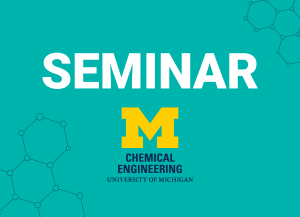Presented By: Chemical Engineering
ChE SEMINAR: "Sustainable Materials for Energy Storage and Conversion Technologies"
Magda Titirici, Imperial College London

The ChE Seminar Series features guest speakers from various research backgrounds throughout the year. ChE faculty and graduate students are especially encouraged to attend.
Abstract: The biggest challenge humanity is facing is climate change. We need multi-disciplinary research efforts to help mitigate CO2 emissions and ideally reach a zero-pollution society by 2050 or sooner. In this talk, I will present my research group efforts in this quest for sustainability and advanced technology. I will talk about our research in designing sustainable and cost-effective carbon anodes for Na ion batteries as well as cathodes for Li-S batteries. I will introduce the concepts of both Li and Na “anodeless” batteries which may help us to get to higher energy densities. I will also talk about our efforts in replacing Pt at the cathode of fuel cells by N-Fe-C catalysts and our LCA studies suggesting that perhaps this route is not the most sustainable of all. If time allows, I will also talk about our latest research in biomass electrolysis allowing us to produce green H2 and high value chemicals at the same time with a lower electricity consumption compared to water electrolysis.
Bio: Magda Titirici is a Chair in Sustainable Energy Materials at Imperial College London in the Department of Chemical Engineering and a RAEng Chair in Sustainable Emerging Technologies. Her research interests are in the area of energy storage and conversion using sustainable materials, in particular batteries beyond Li-ion as well as sustainable catalysts for electrolysers and fuel cells along with biomass electrolysis to clean chemicals and fuels. She has published over 300 papers in this area and she is on the list of highly cited researchers (Clarivate) for the past 6 years. Her research won numerous awards such as the Corday Morgan Prize from the Royal Society of Chemistry, The Griffith medal from the Institute of Materials and Mines as well as the Kavli medal and lecture from Royal Society. Magda is a big ambassador for a more diverse and inclusive STEM working closely with RSC and RAEng in such efforts.
Abstract: The biggest challenge humanity is facing is climate change. We need multi-disciplinary research efforts to help mitigate CO2 emissions and ideally reach a zero-pollution society by 2050 or sooner. In this talk, I will present my research group efforts in this quest for sustainability and advanced technology. I will talk about our research in designing sustainable and cost-effective carbon anodes for Na ion batteries as well as cathodes for Li-S batteries. I will introduce the concepts of both Li and Na “anodeless” batteries which may help us to get to higher energy densities. I will also talk about our efforts in replacing Pt at the cathode of fuel cells by N-Fe-C catalysts and our LCA studies suggesting that perhaps this route is not the most sustainable of all. If time allows, I will also talk about our latest research in biomass electrolysis allowing us to produce green H2 and high value chemicals at the same time with a lower electricity consumption compared to water electrolysis.
Bio: Magda Titirici is a Chair in Sustainable Energy Materials at Imperial College London in the Department of Chemical Engineering and a RAEng Chair in Sustainable Emerging Technologies. Her research interests are in the area of energy storage and conversion using sustainable materials, in particular batteries beyond Li-ion as well as sustainable catalysts for electrolysers and fuel cells along with biomass electrolysis to clean chemicals and fuels. She has published over 300 papers in this area and she is on the list of highly cited researchers (Clarivate) for the past 6 years. Her research won numerous awards such as the Corday Morgan Prize from the Royal Society of Chemistry, The Griffith medal from the Institute of Materials and Mines as well as the Kavli medal and lecture from Royal Society. Magda is a big ambassador for a more diverse and inclusive STEM working closely with RSC and RAEng in such efforts.